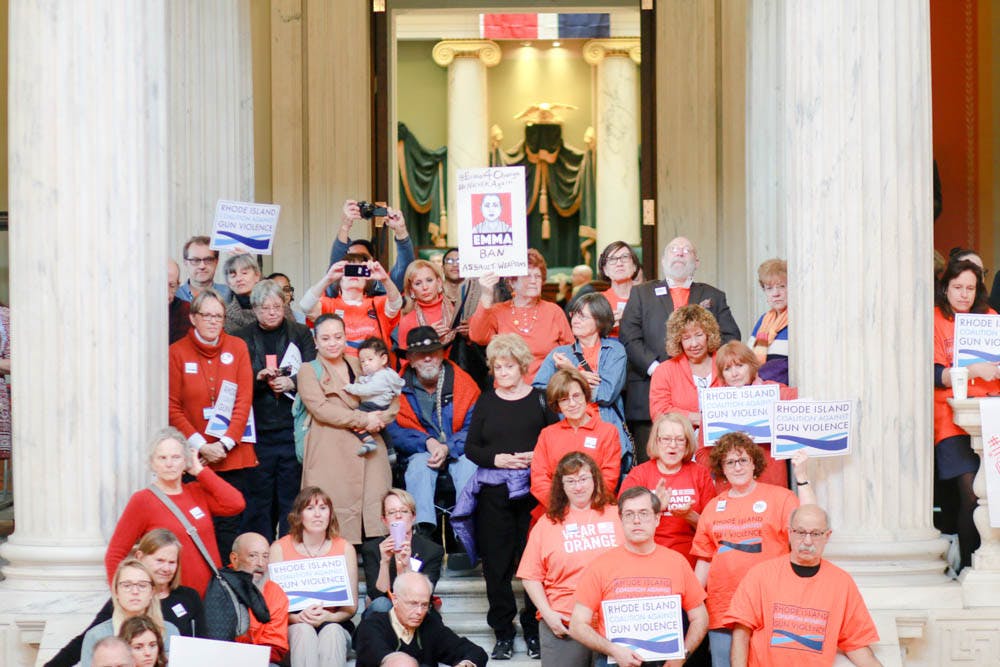Fifteen-year-old Adah Bryan urged lawmakers to do more to prevent gun violence, listing off the mass shootings that had occurred in her lifetime before a crowd of over a hundred community members gathered in the State House rotunda Tuesday afternoon.
“People say we’re too young to know what we’re talking about, but I’m a young adult who has seen these shootings over and over and over again,” said Bryan, a ninth grader from Classical High School. “Laws need to be passed, action needs to be taken.”
“Don’t let us be the next Parkland, the next Sandy Hook, the next Columbine,” she added.
The Rhode Island Coalition Against Gun Violence organized the rally in support of the “Rhode Island Assault Weapons Ban Act of 2018.” The bill was introduced into the R.I. General Assembly by Senator Josh Miller D-Cranston, Providence and Representative Jason Knight D-Bristol, Warren on Tuesday.
The legislation (2018-S 2493) would ban the sale and ownership of semiautomatic rifles, pistols and shotguns — including the AR-15 rifle, a weapon used in a series of mass shootings including Sandy Hook and, recently, Stoneman Douglas High School in Parkland, Florida Feb. 14. The bill has 29 sponsors in the House and 18 in the Senate, according to a press release from the R.I. General Assembly. Ten states, including Massachusetts and Connecticut, have passed similar legislation.
“These (assault) weapons have so much more lethality than just a regular shotgun or handgun,” said Linda Finn, president of RICAGV. “It’s really important to keep them off the streets and away from people.”
The bill would also prohibit “large capacity” magazines that would accept more than ten rounds of ammunition.
Currently Rhode Island only allows five rounds of magazine capacity for deer hunting and three rounds for duck hunting, RICAGV stated in a press release.
However, the bill does allow for the continued use of some “grandfathered” assault weapons and exempts R.I. peace officers.
Last week, Gov. Gina Raimondo signed an executive order, the “Red Flag Law,” directing law enforcement agencies to remove guns from individuals who display signs — including on social media — that they may be a public safety threat.
Raimondo told the crowd that she had felt motivated to enact gun control reform after her 13-year-old daughter demanded to know what she had been doing about gun violence in Rhode Island.
“We’ve had enough talking,” Raimondo said. “Get me the bill and I’ll sign it!”
Lawmakers and activists stressed the importance of listening to the voices of youth in the gun control debate.
Taliq Tillman, a student at the Met School, expressed anger at feeling “overwhelmingly helpless” after hearing about the Parkland shooting, especially following inaction from many lawmakers.
“Silence is tiring, draining and infuriating,” Tillman said. “Silence is another word for acceptance.”
“I stand here today because I believe in myself, my peers and youth, and I believe that we can shape national narratives,” he added.
“Enough is enough,” the crowd chanted in support, many wearing orange shirts in solidarity with the Parkland survivors. “Protect kids, not guns” read one sign, while others hoisted white sheets of paper splattered with red paint.
Not everyone at the rally came in support of the legislation. “There’s a lot more that we can do (to prevent mass shootings) than simply taking away my weapons or infringing upon my rights,” said Greg Brown, a member of both the R.I. Second Amendment Coalition and the NRA. Restricting access to guns could make it more difficult for “good guys” to stop school shootings, he said.
John Rinaldi, president and founder of the Sandy Hook Center, told The Herald that although he supported Raimondo’s executive order and the state’s assault weapons ban, he remained pessimistic about the National Rifle Association’s lobby power on federal and state levels. Since the Sandy Hook shooting in 2012, the gun control movement has been “drowned out by the NRA influence,” he said.
“If people cannot relate or don’t want to actualize the reality of our kids being slaughtered, they will be dismissive, say it’s not an issue, and until you lose your child, you can’t fully comprehend,” Rinaldi said.
The issue of gun violence cannot be fixed by only one piece of legislation, said Pete Bilderback, senior program coordinator at the Institute for Brain and Neural Systems and board member of RICAGV. Still, he emphasized the importance of preventative steps like banning assault weapons.
“When I go to bed, I lock my door. I’m fully aware that doing so won’t keep a professional burglar out of my house,” Bilderback said. “But I lock it anyway because I don’t want to make it easy for them and that’s what we’re doing right now, we’re making it easy for these crimes to happen.”
Other bills on RICAGV’s legislative agenda for 2018 include the Safe Schools Act to restrict concealed carry weapons in K-12 schools and a Gun Violence Restraining Order that prevents individuals who endanger themselves or those around them from buying or owning firearms or ammunition.
A national school walkout is planned for March 14 to protest gun violence in light of the Parkland shooting. Providence high school students will be participating, Bryan said.
“I think that this year is going to be a different year because of (student) voices — you can’t ignore those voices,” Miller said. “This is a large chorus that can’t be denied and it will not stop at red flags, it will not stop at bump stocks, it will not stop at magazines, it will not stop at assault weapons. It will stop when we hear from our schools and our teachers that they feel safe.”
The NRA did not respond to a request for comment.





